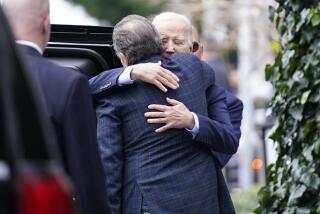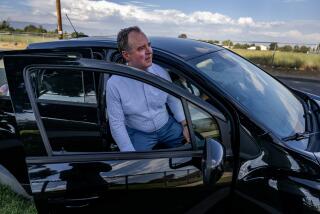Gephardt Voice Still Little Heard in South
- Share via
WINSTON-SALEM, N.C. — Missouri Rep. Richard A. Gephardt had a Super Tuesday audience made to order for his trade message--a group of AT&T; workers from a nearby telecommunications plant that’s ready to close.
The round-table discussion with threatened workers was the kind of campaign moment that Gephardt exploited so well earlier in Iowa, where he won the Democratic presidential caucuses, and in New Hampshire, where he finished second in the primary.
The scene was full of pathos, played well on television and gave Gephardt a perfect forum from which to project his underlying theme--that Americans must rise up in populist anger to right the world’s unfair trading system, and vote for Dick Gephardt in the process.
But there is a difference now as Gephardt takes his trade show South. Unlike voters in Iowa and New Hampshire, who were inundated with information about Gephardt’s trade policies, the voters here--even the AT&T; workers who came to hear Gephardt earlier this week--know little about him.
Fears Flight of Jobs
“At this point I’m not sure who I’ll vote for,” said AT&T; worker Ty Lambert. “Something has got to be done to stop business from moving and going overseas. I don’t know much about Gephardt, but I just came to hear what he had to say about that.”
“Right now we are all kind of neutral,” added Greg Stewart, treasurer of the local union that set up the meeting with Gephardt. “People around here are kind of slow to make up their minds.”
With next week’s Super Tuesday contests in the South just days away, there is a growing consensus among political professionals that Gephardt is the only Democratic candidate who has the kind of focused populist economic message that could appeal to a broad range of Southerners.
“If Gephardt wins big on Super Tuesday, it will be because he had an unanswered television message on the economy,” noted Arkansas Gov. Bill Clinton in an interview. “The votes he has gotten (in Iowa and elsewhere) have come because he has poured his message into a vacuum.”
But Gephardt’s problem now is that few Southern voters have heard that message yet.
Faces Massive Region
With little time to get it out over a massive 20-state Super Tuesday region, Gephardt is finding it difficult to have the kind of sudden impact on voters that he did in the closing weeks of the Iowa campaign.
Unlike Iowa, where his widely heard stump speech and his television ads offered a smoothly integrated package, he must now rely almost completely on television to get his message out. And the candidate who lives by television can also die by television.
For instance, negative ads attacking Gephardt for posing as a populist while accepting money from special interests, launched Thursday by his main rival, Massachusetts Gov. Michael S. Dukakis, could take on added significance in a campaign where that may be the first impression voters receive of the candidate.
Gephardt campaign officials said Thursday they planned to return the fire with an ad attacking Dukakis’ lack of expertise on farm issues. Gephardt also used a press conference Thursday to criticize Dukakis for accepting contributions from firms doing business with the state of Massachusetts.
Little Time for Voters
Meanwhile, the demands of getting Gephardt’s message on the air have drastically cut into the time he has available to meet with voters.
After emerging from the early contests with little money, Gephardt has had to spend much of the last week meeting with contributors to raise $1 million for Southern television time.
Most of the personal appearances he has made in the region in recent days have been little more than television photo opportunities, often crammed into his schedule around fund raisers, with few voters in attendance.
“I don’t think it’s ever as effective to talk to someone over the television or the radio or through the newspapers than it is to talk to them directly as we did in Iowa,” Gephardt admits. “But you do the best you can.”
To compensate for a shortage of live appearances, Gephardt has tried to intensify his “free” television exposure on local news shows.
Uses Satellite Feeds
Like his rivals, he has started to feed live interviews via satellite to groups of local stations. From a Kansas City hotel room on Thursday, for instance, Gephardt rented a television crew to conduct on-air interviews via satellite, with seven stations from Florida, Wyoming, North Carolina, Washington state and Washington, D.C.
“Think of all the flights we’ve avoided today,” he joked between interviews.
Such satellite feeds have become crucial to his campaign. His aides say that so far, Gephardt has been seen in a total of 60 Super Tuesday media markets, but he has actually visited just 20; the other 40 appearances have been by satellite.
To use the campaign’s ad budget most effectively, Gephardt has also targeted his media blitz at cities and states where he believes he has the best chance of winning delegates.
His heaviest emphasis is on the 35 Southern congressional districts represented by his supporters in the House of Representatives. Since delegates in many states will be allocated on the basis of who wins individual congressional districts, such a media strategy could help Gephardt pick up delegates in primaries in which he does badly statewide.
Targets Oil Patch
In addition, he is targeting the oil patch states of Texas, Oklahoma, Louisiana and Arkansas, where Gephardt believes he has an edge because of his support for an oil import fee, which could theoretically help the depressed domestic oil industry.
While he is also on the air in Florida, where Gephardt aides now expect Dukakis to win, his commercials are not running at all in other Super Tuesday states where Gephardt is trailing badly, such as Tennessee, Massachusetts, Virginia, Maryland and Washington state.
But television is still a poor substitute for a live crowd as a means for a candidate to generate electricity.
Gephardt, who developed a passionate speaking style in the final days in Iowa, now often finds it hard to connect with his audiences in the few real public appearances he does make. He seems out of practice; he has started to return to the wooden approach to speechmaking that plagued his campaign last year.
Sympathetic Auto Workers
But on Thursday, Gephardt had a big group of sympathetic auto workers listening to his trade speech in Kansas City, and the crowd seemed to revive him.
More to Read
Get the L.A. Times Politics newsletter
Deeply reported insights into legislation, politics and policy from Sacramento, Washington and beyond. In your inbox twice per week.
You may occasionally receive promotional content from the Los Angeles Times.









